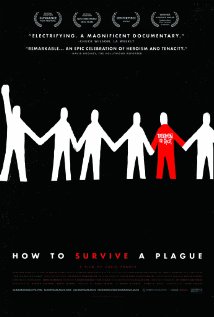How to Survive a Plague
| How to Survive a Plague | |
|---|---|
 |
|
| Directed by | David France |
| Produced by |
Dan Cogan Howard Gertler |
| Written by | David France Todd Woody Richman Tyler H. Walk |
| Music by | Stuart Bogie |
| Cinematography | Derek Wiesehahn |
| Edited by | Todd Woody Richman Tyler H. Walk |
|
Production
company |
|
| Distributed by |
Mongrel Media (Canada theatrical) Sundance Selects (USA theatrical) IFC |
|
Release date
|
|
|
Running time
|
109 min. |
| Country | United States |
| Language | English |
| Box office | $132,055 |
How to Survive a Plague is a 2012 American documentary film about the early years of the AIDS epidemic, and the efforts of ACT UP and TAG. It was directed by David France, a journalist who covered AIDS from its beginnings. For France it was his first film. He dedicated it to his partner Doug Gould, who died of AIDS-related pneumonia in 1992. The documentary was produced using more than 700 hours of archived footage which included news coverage, interviews as well as film of demonstrations, meetings and conferences taken by ACT UP members themselves. France says they knew what they were doing was historic, and that many of them would die. The film, which opened in select theatres across the United States on September 21, 2012, also includes footage of a demonstration during mass at St. Patrick's Cathedral in 1989.
People featured in the film include:
Beginning at the start of the HIV/AIDS epidemic in the United States, the documentary follows a group of AIDS activists and founders of AIDS group ACT UP, and follows their struggle for response from the United States government and medical establishment in developing effective HIV/AIDS medications. Activists took it upon themselves to get the FDA to approve drugs that could slow down or even halt the AIDS virus and demanded that the trials that would usually take 7–10 years to test be shortened and put on the market. It also documents the underground market for HIV drugs. Many people relied on drugs imported from other countries that could potentially slow down the HIV virus, despite the medications not being FDA approved. At the time, the only drug available to slow the progression of HIV was AZT which was in many cases toxic to HIV infected people, and in some cases caused blindness. The cost of AZT was about $10,000 a year in the late 1980s, which many HIV activists considered too expensive. ACT UP's efforts led to the creation of the International Aids Conference. DDI-an alternative medication to AZT, that did not cause blindness was released by the FDA despite not going through a full length safety trial.
...
Wikipedia
